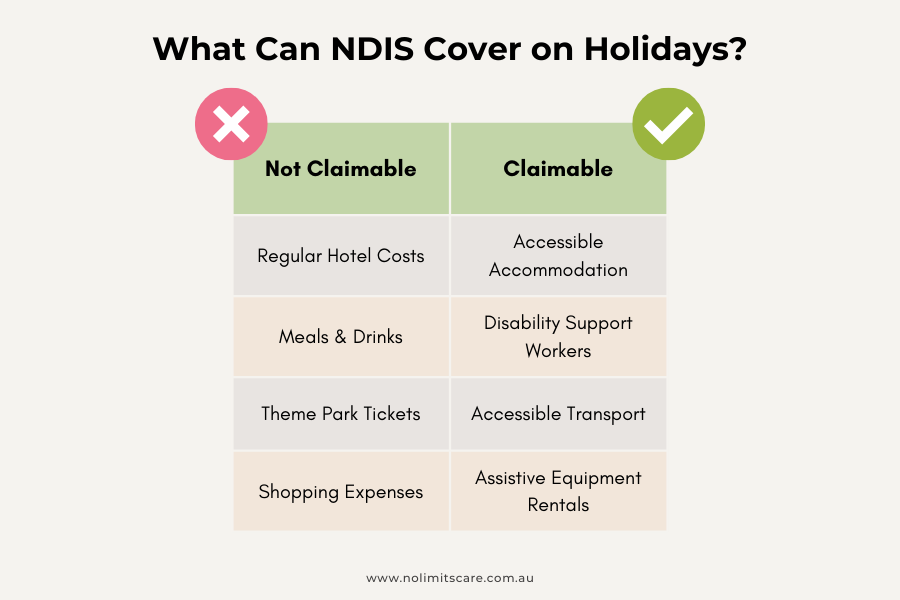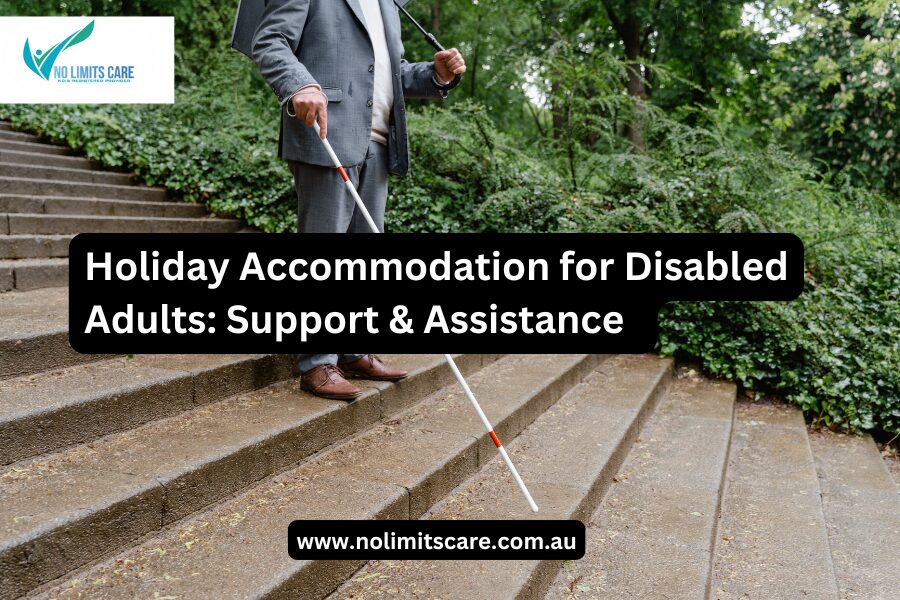Planning a holiday should be an exciting experience, a chance to relax and explore. However, for disabled adults, the process can often feel overwhelming, filled with concerns about accessibility and support. We understand the challenges you face, and we’re here to help. This blog aims to be your comprehensive guide, providing practical advice and support to ensure your dream holiday becomes a reality.
Whether you’re looking for holiday accommodation for disabled adults in Victoria or planning a broader Australian adventure, this guide will empower you with the knowledge and resources you need. We’ll delve into how the National Disability Insurance Scheme (NDIS) can fund your accessible holiday, explore the benefits of travelling with a support worker, and provide practical tips for finding the perfect wheelchair friendly holiday accommodation.
Your Accessible Holiday Guide: Planning, Support, and NDIS

Understanding Your NDIS Plan for Holidays
Your NDIS plan can be a powerful tool for funding your accessible holiday. It’s crucial to understand how to leverage your funding for accommodation, support, and travel.
- Funding Usage: NDIS funding can cover reasonable and necessary supports related to your disability while on holiday, including accessible accommodation, personal care, and transportation.
- Planning Inclusion: When reviewing or creating your NDIS plan, explicitly include your holiday goals. Outline your desired destinations, support needs, and estimated costs.
- Maximising Funding: Provide detailed quotes and evidence to support your funding requests. Research accessible accommodation and support services to demonstrate the necessity of your expenses.
- Claimable Items: Generally, funding can cover modifications to accommodation, personal care support, and accessible transportation. However, it typically doesn’t cover general holiday costs like meals or entertainment.
- Plan Management & Self Management: Plan managed NDIS participants can have their plan managers pay for holiday related supports, and self managed participants can pay and claim directly.
- Disability accommodation examples can include modified hotel rooms, accessible holiday cottages, and specialised resorts.
Finding the Perfect Accessible Accommodation
Finding suitable holiday accommodation for disabled people can be simplified with the right resources and strategies.
- Online Directories: Utilise specialised websites like Accessible Accommodation and Disabled Holidays, which offer comprehensive listings of wheelchair accessible holiday cottages and other accessible options.
- Accessibility Checklists: Develop a checklist to assess property accessibility, including features like ramp access, wide doorways, accessible bathrooms, and adjustable beds.
- Communication with Providers: Clearly communicate your specific needs to accommodation providers. Ask detailed questions about accessibility features and request photos or videos of the property.
- Accommodation Types: Explore various options, including accessible hotels, self-contained apartments, and specialised resorts designed for disabled travellers.
- No Limits Care: No Limits Care can be a valuable resource for finding suitable disabled accommodation Victoria and providing support services during your holiday.
Start your accessible holiday adventure today: explore resources, connect with support, and make your travel dreams a reality.
Planning Your Accessible Itinerary
Australia boasts numerous accessible holiday destinations.
- Destination Guides: Explore popular destinations like the Gold Coast, Great Barrier Reef, and Melbourne, with detailed information on accessible attractions, restaurants, and activities.
- Accessible Transportation: Research accessible public transportation options, including wheelchair-accessible buses, trains, and taxis. Consider renting a modified vehicle for greater flexibility.
- Accessible Tour Companies: Look for tour companies specialising in accessible travel, offering guided tours and activities tailored to your needs.
Arranging Personal Support and Assistance
Travelling with a support worker can significantly enhance your holiday experience.
- Finding Support Workers: Utilise online platforms and disability support organisations to find qualified support workers with travel experience.
- Communicating Needs: Clearly communicate your support needs, preferences, and daily routines to your support worker.
- Respite Care: Explore respite care options during your holiday, providing temporary relief for your primary caregivers.
- Support Worker Preparation: Provide your support worker with a detailed itinerary, medical information, and emergency contact details.
- Medical Equipment: Plan for the transportation and storage of medical equipment, ensuring it’s properly labelled and packed.
Accessibility Beyond Accommodation
Accessibility extends beyond accommodation to all aspects of your holiday.
- Accessible Transportation: Ensure access to wheelchair-accessible taxis, rental cars, and other transportation options.
- Packing and Preparation: Create a packing checklist, including essential medications, medical supplies, and personal items.
- Travel Documents: Prepare essential travel documents, including medical information, NDIS plan details, and emergency contact information.
- Accessible Beaches and Parks: Research accessible beaches with matting and beach wheelchairs, and accessible parks with paved pathways and accessible facilities.
Navigating Legal Rights and Accessibility Laws
Understanding your rights is crucial for advocating for your needs.
- Disability Rights: Familiarise yourself with disability rights and accessibility laws in Australia, including the Disability Discrimination Act.
- Making Complaints: Know how to make complaints if accessibility standards are not met, and advocate for your rights.
Emergency Planning for Accessible Holidays
Prioritise safety by creating an emergency plan.
- Emergency Plan: Develop a plan for medical or other emergencies, including contact information for emergency services and medical facilities.
- Medical Conditions: If you have medical conditions, ensure you have sufficient medication, medical supplies, and a plan for managing potential issues.
Concluding Thoughts
In essence, planning a holiday as a disabled adult requires thoughtful preparation and a proactive approach. However, the journey to a memorable and enjoyable getaway is absolutely within reach. By leveraging the resources available, including your NDIS plan, specialised accommodation directories, and the support of experienced professionals, you can confidently navigate the process.
Remember, your dream holiday is not just a possibility; it’s a right. We encourage you to embrace the adventure, explore the beauty of Australia, and create lasting memories. Don’t hesitate to reach out to the supportive community and organisations mentioned in this guide, including No Limits Care, to ensure your next holiday is truly accessible and fulfilling. Your journey to accessible travel starts now.



